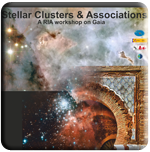The ALHAMBRA Photometric System
Aparicio Villegas, T., Alfaro, E.J., Cabrera-Caño, J., Moles, M., Benítez, N., Perea, J., del Olmo, A., Fernández-Soto, A., Cristobal-Hornillos, D., Husillos, C., Aguerri,, J.A.L. , Broadhurst, T., Castander, F.J., Cepa, J., Cerviño, M., González Delgado, R.M., Infante, L., Márquez, I., Masegosa, J., Martínez, V.J., Prada, F., Quintana, J.M., Sánchez, S.F.
The Astronomical Journal, Volume 139, Issue 3, pp. 1242-1253 (2010).
03/2010
ABSTRACT
This paper presents the characterization of the optical range of the ALHAMBRA photometric system, a 20 contiguous, equal-width, medium-band CCD system with wavelength coverage from 3500 Å to 9700 Å. The photometric description of the system is done by presenting the full response curve as a product of the filters, CCD, and atmospheric transmission curves, and using some first- and second-order moments of this response function. We also introduce the set of standard stars that defines the system, formed by 31 classic spectrophotometric standard stars which have been used in the calibration of other known photometric systems, and 288 stars, flux calibrated homogeneously, from the Next Generation Spectral Library (NGSL). Based on the NGSL, we determine the transformation equations between Sloan Digital Sky Survey ugriz photometry and the ALHAMBRA photometric system, in order to establish some relations between both systems. Finally, we develop and discuss a strategy to calculate the photometric zero points of the different pointings in the ALHAMBRA project.


